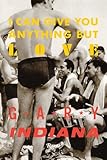I read and re-read Fred Moten’s The Little Edges this summer, dipping in and out of poems, intrigued and amazed by how they could be at the same time so elusive and eloquent, mysterious and clear. And then I discovered Vincent Katz’s hugely impressive translations of The Complete Elegies of Sextus Propertius, published in 2004. Like Catullus, Propertius was a powerful influence on New York School writers, a classical model for a first-person poetic narration that mixed high and low; sophisticated literary allusion and direct address. Katz’s translations are less sensational than those of his 20th-century predecessors, less concerned with the shock-value of Propertius’s odes to his courtesan girlfriend than with how the poems work on a metrical level, graphing emotional states.

 Similarly, Gary Indiana’s memoir, I Can Give You Anything But Love, published this fall by Rizzoli, offers a new model for what a “memoir” can be. Foraging across screen memories of childhood — “my memory,” as he writes, “is a viscid, opaque continuum of fragments” — Indiana soon abandons the enterprise. Instead, he gives an account of a life-long friendship and a series of visits to an increasingly “open” and neoliberalized Cuba. As he writes: “Of course it’s coming, coming here, coming soon, the gathering tsunami of Our Kind of Capitalism. iPad, iPod, YouTube, Buy It, Love It, Fuck It, Dump It, Buy a New One. The people who sell all this shit say it’s what people want, and they’re not wrong. But if people knew what they were in for, their heads would explode.”
Similarly, Gary Indiana’s memoir, I Can Give You Anything But Love, published this fall by Rizzoli, offers a new model for what a “memoir” can be. Foraging across screen memories of childhood — “my memory,” as he writes, “is a viscid, opaque continuum of fragments” — Indiana soon abandons the enterprise. Instead, he gives an account of a life-long friendship and a series of visits to an increasingly “open” and neoliberalized Cuba. As he writes: “Of course it’s coming, coming here, coming soon, the gathering tsunami of Our Kind of Capitalism. iPad, iPod, YouTube, Buy It, Love It, Fuck It, Dump It, Buy a New One. The people who sell all this shit say it’s what people want, and they’re not wrong. But if people knew what they were in for, their heads would explode.”
Finally, I was excited to read Joni Murphy’s new novel Double Teenage that will come out from Bookthug, Toronto next year. Murphy traces the lives of two women who grew up in Las Cruces, N.M., and separately flee for points north. From the micro-inflictions of “self-harm” to the systemic violence around them, they struggle to make sense of their surroundings through sex, romance, and drugs; fashion, literature, theater, critical theory, and art. Double Teenage seems like the definitive book of The Young Girl as defined by Tiqqun. It’s also a definitive book about NAFTA, the Ciudad Juarez femicides, spectacular serial killings, and media’s comforting lull.
More from A Year in Reading 2015
Don’t miss: A Year in Reading 2014, 2013, 2012, 2011, 2010, 2009, 2008, 2007, 2006, 2005
The good stuff: The Millions’ Notable articles
The motherlode: The Millions’ Books and Reviews
Like what you see? Learn about 5 insanely easy ways to Support The Millions, and follow The Millions on Twitter, Facebook, Tumblr.










